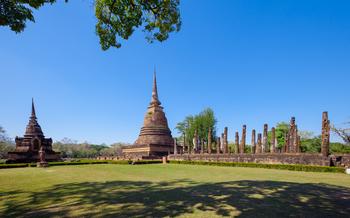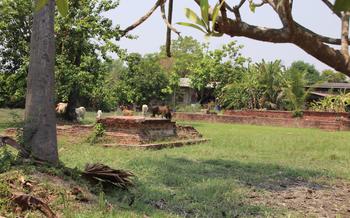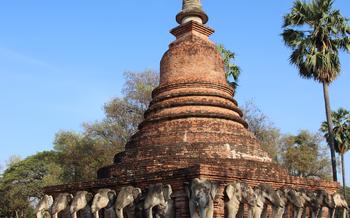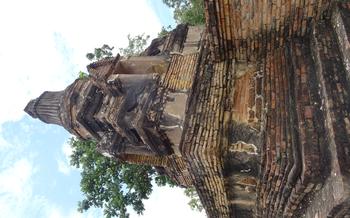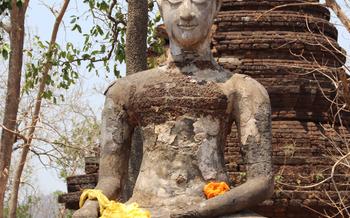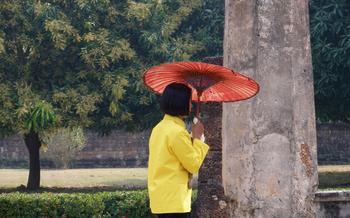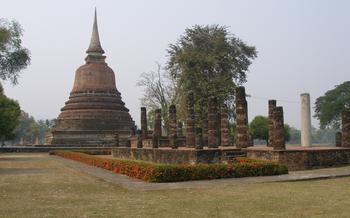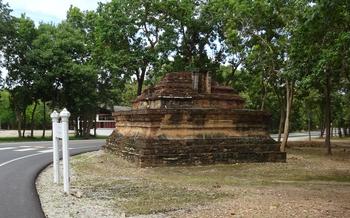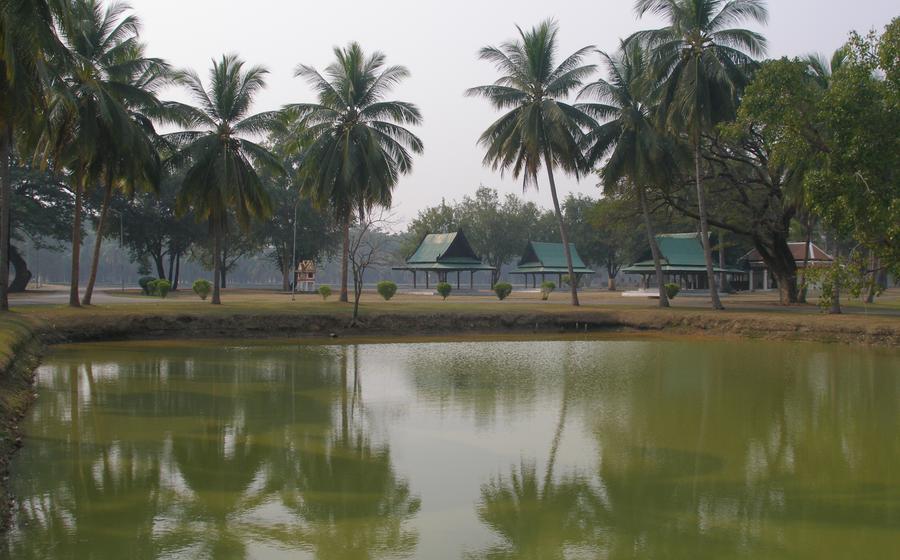
Aranyik Village
- Sukhothai: A City of Historical Significance
- The Village's Artisan Legacy
- Witnessing the Pottery Making Process
- Learning the Art of Thai Weaving
- Exploring the Village's Temples
- Strolling Through the Local Market
- Joining a Cooking Class
- Experiencing the Village Homestay Program
- Exploring the Surrounding Countryside
- Attending a Village Festival
- Supporting Local Conservation Efforts
- Reflecting on the Aranyik Experience
- Insider Tip: Hidden Gems of Aranyik
Sukhothai: A City of Historical Significance
Sukhothai, an ancient city located in central Thailand, holds a significant place in the country's history. It served as the capital of the Sukhothai Kingdom, established in the 13th century by King Sri Indraditya. The kingdom marked the beginning of Thai independence and served as a crucial hub for trade and cultural exchange. Under the reign of King Ramkhamhaeng the Great, Sukhothai reached its golden age, becoming renowned for its art, literature, and religious achievements. The kingdom's legacy can still be seen in the magnificent ruins of its temples and palaces, which have been designated as a UNESCO World Heritage Site.
To reach Sukhothai from Bangkok, one can take a direct train or bus from the capital's main transportation hubs. The journey by train takes approximately 6-7 hours, while the bus ride lasts around 5-6 hours. Both options offer comfortable and affordable travel, allowing visitors to immerse themselves in the charm of Thailand's historical and cultural heritage.
The Village's Artisan Legacy
Aranyik Village is renowned for its rich craft traditions, passed down through generations of skilled artisans. Pottery, weaving, and silverwork are the village's specialties, each showcasing the unique talents and creativity of the local craftspeople.
Pottery: Aranyik's potters are known for their exquisite pottery, crafted using traditional techniques and locally sourced clay. Visitors can witness the entire pottery-making process, from molding the clay on a potter's wheel to firing the finished pieces in kilns. The village is home to several pottery workshops, where you can observe the artisans at work and purchase beautiful handmade pottery items, including decorative vases, plates, and figurines.
Weaving: Weaving holds a special place in Thai culture, and Aranyik's weavers are renowned for their intricate designs and vibrant colors. Using traditional looms, the artisans create stunning textiles, including scarves, shawls, and cushion covers. Visitors can watch the weavers as they skillfully manipulate the threads to create intricate patterns, and even try their hand at weaving under the guidance of experienced artisans.
Silversmithing: Aranyik's silversmiths are masters in crafting delicate and intricate silver jewelry and ornaments. Using traditional tools and techniques, they transform silver into beautiful necklaces, earrings, bracelets, and rings. Visitors can witness the silversmiths at work, observing the intricate process of shaping, soldering, and polishing the silver. The village is home to several silver workshops, where you can purchase unique and handcrafted silver jewelry as a memorable souvenir.
Aranyik's artisans are passionate about preserving their cultural heritage and sharing their skills with visitors. By supporting their work, you not only take home a beautiful souvenir but also contribute to the sustainability and preservation of this unique village's rich traditions.
Witnessing the Pottery Making Process
Pottery holds a significant place in Aranyik's cultural heritage, with the village renowned for its skilled potters and exquisite ceramic creations. The pottery making process in Aranyik is a captivating spectacle, showcasing the intricate techniques and artistry passed down through generations.
Local potters begin by carefully selecting and preparing the clay, ensuring its smoothness and consistency. They then skillfully mold the clay into various shapes using a combination of hand-building techniques and potter's wheels. The delicate touch and precision of the potters are evident as they transform lumps of clay into graceful forms, each piece imbued with a unique character.
Once the pottery has taken shape, it is meticulously dried and fired in traditional kilns. The firing process is crucial, as it involves controlling the temperature and duration of the heat to achieve the desired strength and color of the pottery. The potters carefully monitor the kilns, ensuring that each piece receives the optimal conditions for firing.
After firing, the pottery is left to cool and harden. The final step is the application of intricate designs and patterns, often inspired by nature or traditional motifs. These decorative elements are meticulously hand-painted or carved onto the surface of the pottery, adding a touch of elegance and uniqueness to each piece.
Visitors to Aranyik have the opportunity to witness the entire pottery making process, from the initial clay preparation to the final decoration. Local potters are typically welcoming and eager to share their knowledge and skills with visitors. You can observe their deft hands at work, learn about the techniques they employ, and admire the stunning array of finished products.
Whether you are an art enthusiast, a curious traveler, or simply someone who appreciates the beauty of handcrafted objects, witnessing the pottery making process in Aranyik is an unforgettable experience. It offers a glimpse into the village's rich cultural heritage and the artistry that lies at the heart of its community.
Learning the Art of Thai Weaving
Aranyik Village is renowned for its exquisite woven textiles, a testament to the village's rich weaving traditions. Passed down through generations, the art of Thai weaving holds a special place in the community's cultural heritage.
In Aranyik, you'll find skilled weavers who create intricate patterns and designs using traditional looms. Witnessing their artistry is a mesmerizing experience. The weavers deftly manipulate threads, transforming them into beautiful fabrics that showcase their creativity and precision.
Visitors to Aranyik have the unique opportunity to learn this ancient craft firsthand. Several workshops offer hands-on weaving experiences, where you can try your hand at creating your own woven souvenir. Under the guidance of experienced weavers, you'll learn the basics of weaving, from setting up the loom to selecting yarns and creating patterns.
The weaving workshops are a wonderful way to connect with the local artisans and gain a deeper appreciation for their skills. As you work on your own weaving project, you'll discover the patience, dedication, and artistry that goes into each piece.
Whether you're a complete beginner or have some weaving experience, the workshops in Aranyik offer a rewarding and immersive experience. You'll not only learn a new skill but also contribute to the preservation of this traditional art form.
Exploring the Village's Temples
Aranyik Village is home to several stunning temples that offer a glimpse into the spiritual and cultural heritage of the region. The most prominent among them is Wat Aranyik, the village's main temple. It boasts intricate architectural features, including a grand ordination hall, a graceful chedi, and beautifully carved wooden structures. The temple is a place of worship for the villagers and a source of pride for the community.
Another must-visit temple in Aranyik is Wat Sawang Arom, which is renowned for its exquisite murals and sculptures. The temple walls are adorned with vibrant paintings depicting scenes from Buddhist mythology and Thai history. The intricate stuccowork and sculptures add to the temple's charm, making it a true masterpiece of Thai craftsmanship.
When visiting the temples in Aranyik, it is important to dress respectfully and observe proper temple etiquette. Visitors should remove their shoes before entering the temple grounds and avoid pointing their feet towards Buddha images. It is also considered disrespectful to speak loudly or engage in inappropriate behavior within the temple premises.
Strolling Through the Local Market
Amidst the vibrant tapestry of Aranyik Village lies its bustling local market, a kaleidoscope of colors, aromas, and friendly faces. Nestled in the heart of the village, this vibrant marketplace serves as a pulsating hub of commercial activity and cultural exchange. As you venture into its labyrinthine alleys, your senses will be ignited by the sights, sounds, and smells that permeate the air.
In this lively bazaar, you'll find an eclectic array of goods, from fresh produce plucked straight from nearby farms to handcrafted souvenirs that showcase the village's rich artisanal heritage. Vendors proudly display their wares, inviting you to browse and discover unique treasures. From intricate woven textiles to gleaming silver jewelry, the market is a haven for those seeking authentic souvenirs to cherish.
As you wander through the narrow lanes, be sure to sample the delectable local delicacies that are a testament to Aranyik's culinary prowess. From mouthwatering grilled meats to sweet and sticky desserts, there's something to satisfy every palate. Don't be shy to engage with the friendly vendors, who are more than happy to share stories about their products and the village's traditions.
To fully immerse yourself in the market experience, embrace the local custom of bargaining. While prices are generally fair, engaging in friendly negotiations is a time-honored tradition that adds an element of excitement to your shopping adventure. With a smile and a bit of patience, you'll likely score some great deals on unique items that you'll treasure for years to come.
Joining a Cooking Class
Thai cooking classes have become increasingly popular among visitors to Thailand, offering a unique opportunity to learn the art of preparing traditional Thai dishes using fresh, local ingredients. In Aranyik Village, several cooking schools offer classes that cater to different skill levels and interests. Participants can choose from a variety of menus, featuring classic Thai dishes such as Pad Thai, Green Curry, and Mango Sticky Rice. Under the guidance of experienced local chefs, students learn the basics of Thai cuisine, including knife skills, ingredient selection, and the delicate balance of flavors.
Cooking classes typically take place in small groups, providing a personalized and interactive learning experience. Participants have the chance to work alongside local chefs, asking questions and receiving hands-on guidance. Classes often include a visit to the local market, where students can learn about the different ingredients used in Thai cooking and select fresh produce for their dishes. The market visit also offers an opportunity to interact with local vendors and gain insights into the daily life of the village.
After the cooking session, participants gather around a communal table to enjoy the delicious dishes they have prepared. This is a great opportunity to share a meal with fellow travelers and villagers, creating a sense of community and fostering cultural exchange. Cooking classes in Aranyik Village are not only a fun and educational experience but also a wonderful way to connect with the local people and learn about Thai culinary traditions.
Experiencing the Village Homestay Program
Aranyik Village offers a unique homestay program that allows visitors to immerse themselves in the local way of life. Staying with a local family provides an authentic cultural experience, enabling travelers to learn about Thai customs, traditions, and daily routines. Participants are welcomed into the homes of villagers, where they can share meals, participate in daily activities, and engage in meaningful conversations.
Homestay families are carefully selected based on their hospitality, warmth, and willingness to share their culture with visitors. They typically live in traditional Thai houses, providing a glimpse into the local architecture and lifestyle. Guests are encouraged to participate in daily activities such as cooking, farming, and crafts, gaining hands-on experience and insights into village life.
The homestay program is an excellent opportunity to connect with the local community, learn about their way of life, and contribute to the preservation of cultural heritage. It allows visitors to go beyond the tourist trail and establish genuine connections with the people of Aranyik.
Here are some tips for making the most of your homestay experience:
- Be open-minded and respectful of the local culture and customs.
- Engage in conversations and ask questions to learn about the village's history, traditions, and way of life.
- Participate in daily activities and chores to gain a deeper understanding of the villagers' lifestyle.
- Show appreciation for the hospitality and kindness of your host family.
- Support the local economy by purchasing handicrafts and souvenirs directly from the villagers.
Exploring the Surrounding Countryside
Beyond the village itself, the surrounding countryside offers a wealth of natural beauty and cultural experiences. Rent a bicycle or motorbike from one of the village guesthouses and embark on a leisurely exploration of the serene landscapes. Cycle through verdant rice fields, where farmers tend to their crops using traditional methods. Visit local orchards, where you can sample fresh fruits straight from the trees and learn about sustainable farming practices. Discover traditional farms, where families raise livestock, cultivate vegetables, and live in harmony with nature. Interact with local farmers, who are always happy to share their knowledge and stories. Remember to be respectful of their privacy and property, and always ask permission before entering their fields or homes.
Attending a Village Festival
Festivals in Aranyik Village
In Thailand, festivals are an integral part of the culture and community life, and Aranyik Village is no exception. These vibrant celebrations bring together villagers and visitors alike to honor traditions, showcase local talents, and foster a sense of unity. The village hosts several major festivals throughout the year, each with its unique charm and significance.
Songkran Festival:
The Songkran Festival, also known as the Water Festival, is the most significant festival in Thailand and is widely celebrated in Aranyik Village. Held annually in April, it marks the Thai New Year and is characterized by water splashing, parades, and merit-making ceremonies. Villagers and visitors alike participate in the festivities, joyously splashing water on each other as a symbol of cleansing and renewal.
Loi Krathong Festival:
The Loi Krathong Festival, held in November, is another important festival in Aranyik. During this festival, villagers gather at the local temple to make and float elaborate krathongs, or decorated rafts, on the nearby river. The krathongs are adorned with flowers, candles, and incense sticks, and are released into the water as a way of paying respect to the water spirits and making wishes for good luck and prosperity.
Local Temple Fairs:
In addition to these major festivals, Aranyik Village also hosts regular local temple fairs, known as "ngan wat." These fairs are held at the village's temples and feature a lively mix of religious ceremonies, traditional performances, food stalls, and games. Visitors can experience the vibrant atmosphere, sample delicious local delicacies, and interact with the villagers, gaining a deeper understanding of the community's customs and traditions.
Tips for Attending Village Festivals:
- To make the most of your festival experience, it's advisable to plan your visit in advance and check the dates of upcoming festivals.
- Dress respectfully, as festivals often involve visits to temples and religious ceremonies.
- Be prepared for crowds and lively celebrations, especially during major festivals like Songkran.
- Respect local customs and traditions, such as removing your shoes before entering temples and asking permission before taking photos of people.
- Support the local community by purchasing food, drinks, and souvenirs from village vendors.
Supporting Local Conservation Efforts
Aranyik Village is not just a place of cultural heritage but also a community dedicated to preserving its natural environment. Conservation initiatives play a crucial role in maintaining the village's serene atmosphere and protecting its rich biodiversity. Visitors can contribute to these efforts by participating in various activities.
One way to support conservation is through tree planting. The village has an ongoing reforestation program aimed at replenishing the surrounding forests and mitigating the effects of climate change. Visitors can join local volunteers in planting trees, contributing to the village's green legacy.
Additionally, wildlife monitoring programs offer an opportunity to observe and learn about the diverse fauna that inhabits the area. Visitors can participate in birdwatching, wildlife tracking, or camera trapping, helping to gather valuable data for conservation purposes.
By actively participating in conservation initiatives, visitors can contribute to the preservation of Aranyik's natural heritage while gaining a deeper understanding of the delicate balance between human activities and the environment. Responsible travel practices, such as minimizing waste, respecting wildlife, and supporting sustainable tourism, are essential for ensuring the long-term viability of the village's unique ecosystem.
Reflecting on the Aranyik Experience
Aranyik Village is a true gem that offers a glimpse into the rich cultural heritage and traditions of Thailand. Its unique blend of historical significance, artisan legacy, and warm hospitality makes it a truly unforgettable destination. Whether you're a history buff, a passionate traveler, or simply someone who appreciates the beauty of local cultures, Aranyik has something to offer everyone.
Reflecting on my time in the village, I am struck by the sense of community and pride that permeates every aspect of life there. The villagers' dedication to preserving their cultural heritage is evident in their unwavering commitment to traditional crafts, their reverence for their temples, and their enthusiastic participation in local festivals.
Their warm smiles and genuine hospitality made me feel welcomed from the moment I arrived. Their willingness to share their stories, traditions, and way of life with visitors is a testament to their openheartedness and their desire to connect with people from all over the world.
As I bid farewell to Aranyik, I couldn't help but feel a deep sense of gratitude for the opportunity to have experienced this unique and vibrant community. It is a place where the past and present intertwine, where tradition and innovation coexist harmoniously, and where the true spirit of Thailand shines brightly.
I encourage every traveler to make a visit to Aranyik Village a priority. It is a place that will leave an enduring impression on your heart and soul, and a reminder of the beauty and diversity of the world we live in.
Insider Tip: Hidden Gems of Aranyik
Beyond the main attractions, Aranyik Village offers a treasure trove of hidden gems waiting to be discovered by curious travelers. Venture off the beaten path and you'll find serene temples nestled amidst lush greenery, secluded viewpoints offering breathtaking panoramas, and natural wonders that showcase the village's unspoiled beauty.
One such hidden gem is the ancient Wat Chedi Sung, located a short walk from the village center. This atmospheric temple features a towering chedi, or Buddhist stupa, surrounded by serene gardens and ancient Buddha images. For a unique perspective of the village and the surrounding countryside, climb to the top of Khao Noi, a small hill located just outside Aranyik. The panoramic views from the summit are simply stunning, especially during sunrise or sunset.
Nature lovers will delight in exploring the lush forests and waterways that surround the village. Rent a bicycle and cycle along the scenic trails, where you can spot exotic birds, butterflies, and other wildlife. For a refreshing dip, head to the nearby Huai Mae Kham Reservoir, where you can swim, paddle, or simply relax on the tranquil shores.
To truly immerse yourself in the local culture, visit the village during one of the many festivals that are celebrated throughout the year. These vibrant events offer a glimpse into the heart of Aranyik's community, with colorful processions, traditional performances, and communal feasts.
Whether you're seeking spiritual enlightenment, breathtaking views, or simply the chance to connect with nature and local culture, Aranyik Village's hidden gems offer something for every traveler. Embrace your sense of adventure and explore beyond the obvious to discover the true essence of this remarkable destination.

